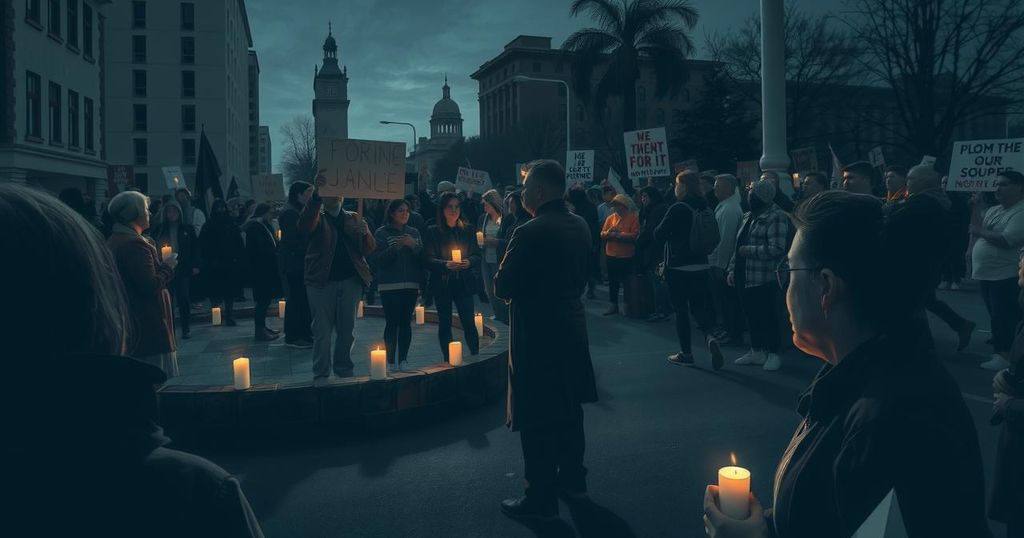Activist Abdelmonem Al-Marimi’s Death Fuels Outrage and Grief in Libya

- Abdelmonem Al-Marimi died in custody under mysterious circumstances.
- Surveillance footage showed his final moments before he jumped.
- The Internal Security Agency denied any wrongdoing regarding his detention.
- Protests erupted following his death, highlighting public anger.
- Al-Marimi’s activism and cultural contributions had a significant impact.
Details Surrounding Abdelmonem Al-Marimi’s Death
The tragic death of Abdelmonem Al-Marimi highlights the ongoing struggles for truth and justice in Libya. Al-Marimi, who was a prominent 42-year-old anti-corruption activist and a father, lost his life under disturbing circumstances in the custody of the Attorney General’s office in Tripoli on July 5. Surveillance footage, released on July 6, captures the final moments of his life, raising significant questions regarding what led to his shocking leap from a third-floor stairwell just moments after he was reportedly cleared for release.
Conflicting Accounts of Detention and Death
The Internal Security Agency (ISA) quickly refuted allegations of abduction and suggested that Al-Marimi’s behavior warranted his detention. According to their statement, he was interrogated before being transferred to the AG’s office, supposedly in “excellent” condition. However, discrepancies emerged, as Al-Marimi was isolated from his lawyer and family during his custody. The AG’s office claimed he was informed of his impending release while the ISA suggested the need for further interrogation, highlighting a deep misalignment in narratives regarding his detention and ultimate demise. The harsh reality is that amid this confusion, a man has tragically died, leaving the nation demanding justice and accountability.
Al-Marimi’s Activism and Cultural Impact
From his impactful protests against corruption to his artistic endeavors, Al-Marimi stood as a beacon of hope and defiance in Libya. Following the political unrest in Tripoli, initiated by waves of protests demanding leadership accountability, Al-Marimi emerged as a central figure—a calm yet determined activist. The backlash from regime-affiliated media claimed him to be a foreign agent and initiated smear campaigns against him as tensions escalated. Alarmingly, he was forced into hiding due to growing threats, seeking refuge in Zawiya. Sadly, he never returned to call me back, something which echoes deep in my regret.
Public Response and Lasting Legacy
His funeral on July 6 transformed into a manifestation of public defiance against corruption and tyranny, drawing thousands to the streets of Zawiya in his honor. Attendees held his photo high, chanted for justice, and made it clear that Al-Marimi’s voice would not be silenced through his death. Even the night after his funeral, mourners converged outside his family home, embodying a united front against authorities they no longer trust. Many recounted Al-Marimi’s last weeks, revealing a man still determined to enact change and remain connected to his community, despite the ever-present dangers.
Skepticism and Public Distrust
This mounting distrust is rooted in a painful history of manipulation and misinformation in Libya—an environment where social media has become a crucial lifeline for news. With conflicting accounts between the ISA and AG swirling, many remain skeptical about the official story surrounding Al-Marimi’s death. The prevalent narrative among supporters is that he faced psychological torment during his final hours—an internal struggle culminating in a tragic end. This ongoing skepticism shapes the perceptions of many activists who fear for their safety amid a volatile political landscape.
A Loss and a Warning for Future Activism
Al-Marimi’s passing acts as a poignant reminder of the precariousness of civic activism in Libya today. His death serves both as a significant loss and a harrowing warning for all who dare to speak their truth in a country still grappling with the consequences of war and political turmoil. For those who dare to rise against corruption or demand change, this moment may signify a pivotal turning point in the nation’s narrative, or yet another chapter littered with silenced voices. As of now, the silence they endeavored to impose appears to have been shattered—but what comes next remains uncertain as Libya seeks to reclaim its story.
The death of Abdelmonem Al-Marimi raises critical questions about the justice system in Libya, with conflicting accounts from authorities fueling public distrust. His activism and cultural contributions left a profound mark on the nation, igniting calls for accountability in the aftermath of his tragic passing. The public response suggests that his death may spur further resistance against corruption, yet how the situation unfolds remains to be seen.







